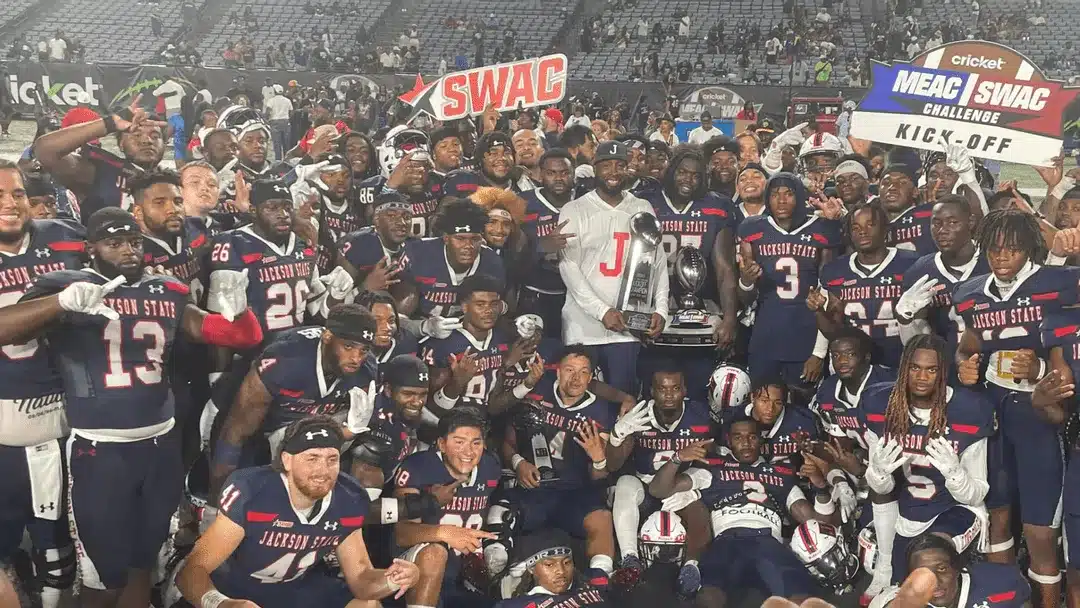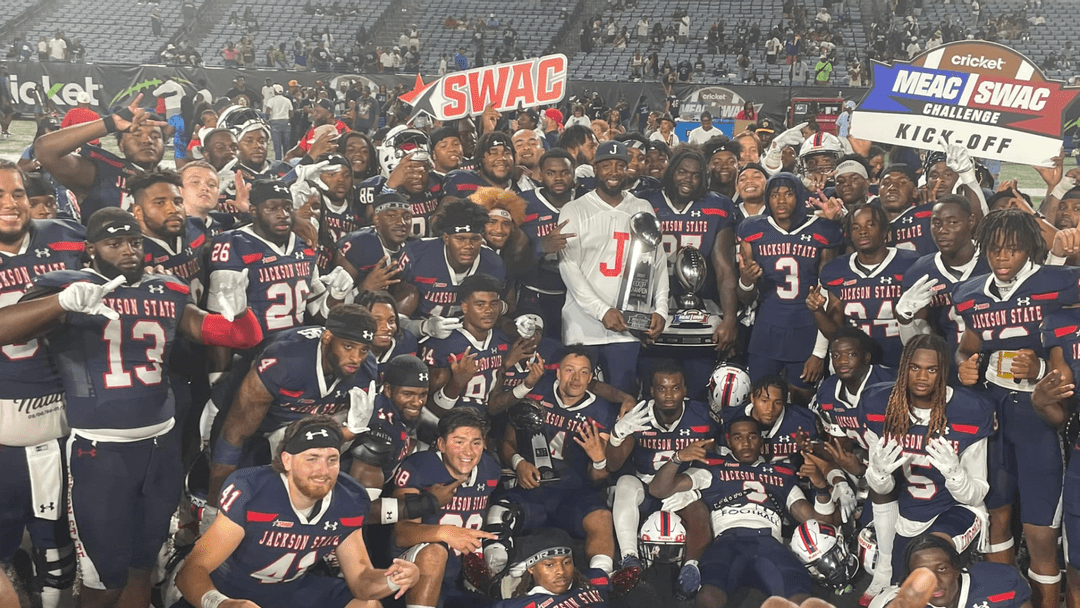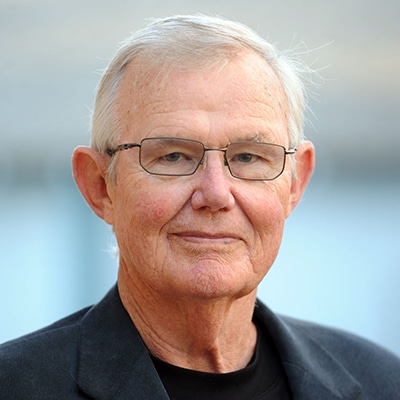Mississippi Today
Deion’s gone and he took his stars, but Jackson State’s T.C. Taylor has reloaded


There was every reason to believe Jackson State football would regress badly after Deion Sanders took his glitzy show — and many of the Tigers’ best players — off to perform in the Rocky Mountains at Colorado.
Not only did Neon Deion depart, but he took much of his coaching staff and nine of his best players with him, including his son Sheddeur Sanders, already established as one of the greatest quarterbacks in SWAC football history. What’s more, 1,100-yard rusher Sy’veon Wilkerson, national No. 1 recruit Travis Hunter and safety Shiloh Sanders headed west to high country. Several other JSU Tigers scattered elsewhere.

To Jackson State alumnus T.C. Taylor fell the daunting task of trying to remake the Tigers’ football roster. Given the mass exodus, the odds were far from favorable.
But guess what? The 2023 T.C. Tigers debuted Saturday night and frankly looked every bit as sharp as any of Sanders’ JSU teams, who won 23 of 26 games over the past two seasons. Taylor’s Tigers slobber-knocked South Carolina State 37-7 in, of all places, Atlanta. The score doesn’t begin to tell you how thoroughly JSU dominated. South Carolina State did not score until the waning seconds. Taylor was nothing if not benevolent. He could have made it 50-0 or worse, had he so decided.
Playing before a national TV audience on ABC, the Tigers were as efficient as they were impressive. They were fundamentally sound and they were exceedingly fast in accomplishing something Deion never did at Jackson State. And that’s to win in Atlanta. Sanders’ Tigers lost two straight times in Atlanta’s Celebration Bowl, first to South Carolina State 31-10 and then to North Carolina Central in overtime last year.
Making Jackson State’s trouncing of South Carolina State all the more impressive is that SC State defeated North Carolina Central 26-24 last season before NC Central defeated Jackson State in the bowl game.
Clearly, Taylor and his staff have done a masterful job of reconstructing the JSU roster. Start with quarterback where nobody in their right mind would expect anyone to come in and replicate Sheddeur Sanders’ brilliance. Enter Jason Brown, a transfer from Virginia Tech, who threw for 367 yards and three touchdowns without throwing an interception. Brown completed 26 of 33 throws. His decision-making was as excellent as his passing accuracy. Brown played sparingly at Virginia Tech last season, but you should know he quarterbacked South Carolina to victories over Florida and Auburn two seasons ago before losing the job.
Running back Irv Mulligan, a Wofford transfer, displayed remarkable balance and quickness in rushing for more than eight yards per carry and 109 yards and a touchdown. Spectacularly talented Travis Hunter may be gone, but Brown has several passing targets from whom to choose. He spread his 26 completions around to eight different receivers.
Defensively, the Tigers just dominated, allowing only 201 yards with much of that coming after Taylor began freely substituting.
Nevertheless, the star of the first-game JSU show has to be T.C. Taylor, the Magnolia native who played high school ball for the venerable Greg Wall at South Pike before becoming one of Jackson State’s football greats. At first glance, Taylor appears the antithesis of Deion Sanders. Sanders is flashy; Taylor is far more subdued and even-keeled. At JSU, Sanders was always the center of attention and clearly liked it that way. Taylor prefers to deflect attention to players and assistants. Sanders was a JSU outsider; Taylor is as Jackson State as they come. When T.C. sings the words “Thee, I love” in the lovely Jackson State alma mater, he means it.
I first saw Taylor play quarterback — and play it well — for Wall at South Pike. He initially played quarterback at JSU, before the great Robert Kent won the job. So Taylor moved to wide receiver and as a senior caught 84 passes for 11 touchdowns.
Taylor may want to deflect attention, but JSU fans were having none of that in Atlanta Saturday night. They were chanting his name as the final seconds ticked down.
“This is just the beginning, but I am really excited about where this team in headed,” Taylor said afterward. “I’m not going to let us get complacent. The sky is the limit for this team.
“Yes, we had a lot of turnover on the roster, but we’ve got a lot of good players. These dudes really get along and they enjoy playing the game.”
One game — even a lopsided victory over a respected opponent on national TV — is no guarantee of future success. But, boy, it really was impressive.
This article first appeared on Mississippi Today and is republished here under a Creative Commons license.
Did you miss our previous article…
https://www.biloxinewsevents.com/?p=280597
Mississippi Today
Speaker White wants Christmas tree projects bill included in special legislative session

House Speaker Jason White sent a terse letter to Lt. Gov. Delbert Hosemann on Thursday, saying House leaders are frustrated with Senate leaders refusing to discuss a “Christmas tree” bill spending millions on special projects across the state.
The letter signals the two Republican leaders remain far apart on setting an overall $7 billion state budget. Bickering between the GOP leaders led to a stalemate and lawmakers ending their regular 2025 session without setting a budget. Gov. Tate Reeves plans to call them back into special session before the new budget year starts July 1 to avoid a shutdown, but wants them to have a budget mostly worked out before he does so.
White’s letter to Hosemann, which contains words in all capital letters that are underlined and italicized, said that the House wants to spend cash reserves on projects for state agencies, local communities, universities, colleges, and the Mississippi Department of Transportation.
“We believe the Senate position to NOT fund any local infrastructure projects is unreasonable,” White wrote.
The speaker in his letter noted that he and Hosemann had a meeting with the governor on Tuesday. Reeves, according to the letter, advised the two legislative leaders that if they couldn’t reach an agreement on how to disburse the surplus money, referred to as capital expense money, they should not spend any of it on infrastructure.
A spokesperson for Hosemann said the lieutenant governor has not yet reviewed the letter, and he was out of the office on Thursday working with a state agency.
“He is attending Good Friday services today, and will address any correspondence after the celebration of Easter,” the spokesperson said.
Hosemann has recently said the Legislature should set an austere budget in light of federal spending cuts coming from the Trump administration, and because state lawmakers this year passed a measure to eliminate the state income tax, the source of nearly a third of the state’s operating revenue.
Lawmakers spend capital expense money for multiple purposes, but the bulk of it — typically $200 million to $400 million a year — goes toward local projects, known as the Christmas Tree bill. Lawmakers jockey for a share of the spending for their home districts, in a process that has been called a political spoils system — areas with the most powerful lawmakers often get the largest share, not areas with the most needs. Legislative leaders often use the projects bill as either a carrot or stick to garner votes from rank and file legislators on other issues.
A Mississippi Today investigation last year revealed House Ways and Means Chairman Trey Lamar, a Republican from Sentobia, has steered tens of millions of dollars in Christmas tree spending to his district, including money to rebuild a road that runs by his north Mississippi home, renovate a nearby private country club golf course and to rebuild a tiny cul-de-sac that runs by a home he has in Jackson.
There is little oversight on how these funds are spent, and there is no requirement that lawmakers disburse the money in an equal manner or based on communities’ needs.
In the past, lawmakers borrowed money for Christmas tree bills. But state coffers have been full in recent years largely from federal pandemic aid spending, so the state has been spending its excess cash. White in his letter said the state has “ample funds” for a special projects bill.
“We, in the House, would like to sit down and have an agreement with our Senate counterparts on state agency Capital Expenditure spending AND local projects spending,” White wrote. “It is extremely important to our agencies and local governments. The ball is in your court, and the House awaits your response.”
This article first appeared on Mississippi Today and is republished here under a Creative Commons Attribution-NoDerivatives 4.0 International License.
Mississippi Today
Advocate: Election is the chance for Jackson to finally launch in the spirit of Blue Origin

Editor’s note: This essay is part of Mississippi Today Ideas, a platform for thoughtful Mississippians to share fact-based ideas about our state’s past, present and future. You can read more about the section here.
As the world recently watched the successful return of Blue Origin’s historic all-women crew from space, Jackson stands grounded. The city is still grappling with problems that no rocket can solve.
But the spirit of that mission — unity, courage and collective effort — can be applied right here in our capital city. Instead of launching away, it is time to launch together toward a more just, functioning and thriving Jackson.
The upcoming mayoral runoff election on April 22 provides such an opportunity, not just for a new administration, but for a new mindset. This isn’t about endorsements. It’s about engagement.
It’s a moment for the people of Jackson and Hinds County to take a long, honest look at ourselves and ask if we have shown up for our city and worked with elected officials, instead of remaining at odds with them.
It is time to vote again — this time with deeper understanding and shared responsibility. Jackson is in crisis — and crisis won’t wait.
According to the U.S. Census projections, Jackson is the fastest-shrinking city in the United States, losing nearly 4,000 residents in a single year. That kind of loss isn’t just about numbers. It’s about hope, resources, and people’s decision to give up rather than dig in.
Add to that the long-standing issues: a crippled water system, public safety concerns, economic decline and a sense of division that often pits neighbor against neighbor, party against party and race against race.
Mayor Chokwe Antar Lumumba has led through these storms, facing criticism for his handling of the water crisis, staffing issues and infrastructure delays. But did officials from the city, the county and the state truly collaborate with him or did they stand at a distance, waiting to assign blame?
On the flip side, his runoff opponent, state Sen. John Horhn, who has served for more than three decades, is now seeking to lead the very city he has represented from the Capitol. Voters should examine his legislative record and ask whether he used his influence to help stabilize the administration or only to position himself for this moment.
Blaming politicians is easy. Building cities is hard. And yet that is exactly what’s needed. Jackson’s future will not be secured by a mayor alone. It will take so many of Jackson’s residents — voters, business owners, faith leaders, students, retirees, parents and young people — to move this city forward. That’s the liftoff we need.
It is time to imagine Jackson as a capital city where clean, safe drinking water flows to every home — not just after lawsuits or emergencies, but through proactive maintenance and funding from city, state and federal partnerships. The involvement of the U.S. Environmental Protection Agency in the effort to improve the water system gives the city leverage.
Public safety must be a guarantee and includes prevention, not just response, with funding for community-based violence interruption programs, trauma services, youth job programs and reentry support. Other cities have done this and it’s working.
Education and workforce development are real priorities, preparing young people not just for diplomas but for meaningful careers. That means investing in public schools and in partnerships with HBCUs, trade programs and businesses rooted right here.
Additionally, city services — from trash collection to pothole repair — must be reliable, transparent and equitable, regardless of zip code or income. Seamless governance is possible when everyone is at the table.
Yes, democracy works because people show up. Not just to vote once, but to attend city council meetings, serve on boards, hold leaders accountable and help shape decisions about where resources go.
This election isn’t just about who gets the title of mayor. It’s about whether Jackson gets another chance at becoming the capital city Mississippi deserves — a place that leads by example and doesn’t lag behind.
The successful Blue Origin mission didn’t happen by chance. It took coordinated effort, diverse expertise and belief in what was possible. The same is true for this city.
We are not launching into space. But we can launch a new era marked by cooperation over conflict, and by sustained civic action over short-term outrage.
On April 22, go vote. Vote not just for a person, but for a path forward because Jackson deserves liftoff. It starts with us.
Pauline Rogers is a longtime advocate for criminal justice reform and the founder of the RECH Foundation, an organization dedicated to supporting formerly incarcerated individuals as they reintegrate into society. She is a Transformative Justice Fellow through The OpEd Project Public Voices Fellowship.
This article first appeared on Mississippi Today and is republished here under a Creative Commons Attribution-NoDerivatives 4.0 International License.![]()
Mississippi Today
On this day in 1959, students marched for integrated schools

April 18, 1959

About 26,000 students took part in the Youth March for Integrated Schools in Washington, D.C. They heard speeches by Martin Luther King Jr., A. Phillip Randolph and NAACP leader Roy Wilkins.
In advance of the march, false accusations were made that Communists had infiltrated the group. In response, the civil rights leaders put out a statement: “The sponsors of the March have not invited Communists or communist organizations. Nor have they invited members of the Ku Klux Klan or the White Citizens’ Council. We do not want the participation of these groups, nor of individuals or other organizations holding similar views.”
After the march, a delegation of students went to present their demands to President Eisenhower, only to be told by his deputy assistant that “the president is just as anxious as they are to see an America where discrimination does not exist, where equality of opportunity is available to all.”
King praised the students, saying, “In your great movement to organize a march for integrated schools, you have awakened on hundreds of campuses throughout the land a new spirit of social inquiry to the benefit of all Americans.”
This article first appeared on Mississippi Today and is republished here under a Creative Commons Attribution-NoDerivatives 4.0 International License.![]()
-

 Mississippi Today6 days ago
Mississippi Today6 days agoLawmakers used to fail passing a budget over policy disagreement. This year, they failed over childish bickering.
-

 Mississippi Today6 days ago
Mississippi Today6 days agoOn this day in 1873, La. courthouse scene of racial carnage
-

 Local News7 days ago
Local News7 days agoAG Fitch and Children’s Advocacy Centers of Mississippi Announce Statewide Protocol for Child Abuse Response
-

 Local News6 days ago
Local News6 days agoSouthern Miss Professor Inducted into U.S. Hydrographer Hall of Fame
-

 News from the South - Alabama News Feed4 days ago
News from the South - Alabama News Feed4 days agoFoley man wins Race to the Finish as Kyle Larson gets first win of 2025 Xfinity Series at Bristol
-

 Our Mississippi Home7 days ago
Our Mississippi Home7 days agoFood Chain Drama | Our Mississippi Home
-

 News from the South - North Carolina News Feed7 days ago
News from the South - North Carolina News Feed7 days agoHelene: Renewed focus on health of North Carolina streams | North Carolina
-

 News from the South - Alabama News Feed5 days ago
News from the South - Alabama News Feed5 days agoFederal appeals court upholds ruling against Alabama panhandling laws


















































